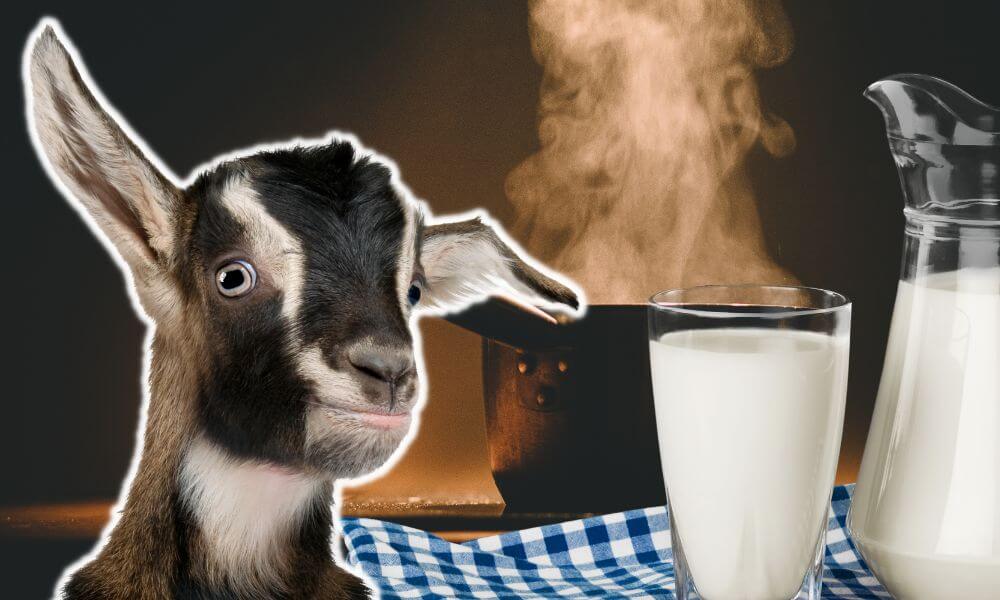If you are lucky enough to own your own milking goats, one thing you might be thinking about is whether or not you need to heat the milk before drinking it, or indeed whether goat’s milk can be safely heated before drinking.
Most of the milk we buy in stores these days is pasteurized, as opposed to raw, so naturally you’re probably wondering whether this is a necessary part of the process of making goat’s milk.
I wasn’t sure myself, so I decided to look into the question in detail.
So, can goat milk be boiled?
Goat’s milk can certainly be heated, but boiling may be excessive. Heating milk is a very common part of processing it, and pasteurized milk is lower in a few potential harmful microbes and bacteria. While it’s not strictly necessary, you may feel more comfortable heating your goat’s milk before drinking. Boiling is not necessary.
There has been an ongoing debate about the quality of pasteurized vs unpasteurized milk since the process was first invented.
Almost all the milk we can find in stores is pasteurized and has been boiled before being sold, but if you have your own milking goats it is entirely up to you.
Some say they prefer the taste of raw milk.
The important thing to remember is that you don’t need to bring it to a boil.
You just need to heat it to around 185 degrees Fahrenheit for about a minute.

Do you need to boil goat’s milk?
The simple answer is no, you don’t.
The process of pasteurization has become a universal practice in the dairy industry because it’s much more difficult to feed a ‘natural’ diet to the sheer quantities of animals you have on industrial farms.
They are fed, more or less exclusively, on grains and formulated animal feed, often containing hormones and proteins that boost milk production.
Pasteurization essentially protects the manufacturers from these substances causing problems for people, however rare those cases might be.
For your goats from home, you will be the arbiter of every part of their diet.
They should have access to a pasture, in which case you can’t literally monitor every single thing they eat.
But you should nonetheless have a good idea of everything that is on their pasture.
If you provide your goat with the best possible diet and all its nutrition, you won’t need to worry about harmful bacteria in the milk because they have a safe and nutritious diet, so they will produce safe and nutritious milk.
There is still no problem with pasteurizing milk, but even if you do you don’t need to boil it.
Boiling is likely to cause the milk to reduce and evaporate.
Just bring the milk to about 185 F for a minute or so, let it cool back down and your milk is pasteurized.
Is it safe to drink raw goat’s milk?
Raw goat’s milk is definitely safe to drink.
People drink raw goat’s milk constantly without processing it at all.
In fact, goats are among the oldest of domesticated creatures, and humanity could have been using their milk for as long as 10,000 years.
The process of pasteurization was only really invented in the late 19th Century.
So you have nothing to fear from raw goat’s milk.
Of course, there are steps you should take to ensure that your goat produces clean, quality milk.
As I said, keeping the animal well fed on a balanced diet is essential.
If it has all the proper nutrients flowing through its body, it will be healthy and equally able to produce healthy milk.
You will also need to keep the goat clean, and especially keep her udder clean.
Washing your goat doesn’t have to be a weekly process, but you should stick to it as regularly as you can with a milking goat.
More importantly, make sure her pen and sleeping area are kept clean.
All sorts of bacteria and harmful insects can nest in there and cause problems for your goat which, in turn will cause problems for her milk.
As long as you have a clean, happy, well fed goat, it will produce healthy, tasty milk that you can drink safely raw.
| Related Posts |
|---|
Can goat’s milk be heated?
Like me, you may also have just never grown out of enjoying your warm milk as a kid—I take no shame in admitting it!
Goat’s milk will certainly stand some light heating, but it is unfortunately not as robust as cow’s milk when it comes to being warmed up.
You definitely don’t want to warm up goat’s milk in the microwave, as this can cause it to lose some of its essential nutrition.
To heat up goat’s milk, just do so on a pan in a stove at a low heat.
Don’t let it get too hot.
Common advice is to heat it to around the temperature it would be inside the mother goat—around 102-103 degrees Fahrenheit.
Again, do not boil the milk and then let it cool to the temperature you want.
It won’t come out looking or tasting like what you want.
Heating gently is the key.
Boiling, then, is the key point here.
Pasteurization does not involve boiling but just high heating sustained for a short time.
If you’re just trying to process your goats’ milk from your homestead, then you don’t need to boil it.
In fact, you don’t need to heat it at all.
Raw goat’s milk is perfectly safe in moderation, and some even prefer it to highly processed milk.
One thing is for sure, you will appreciate the freshness of your own goats’ milk a great deal, whether pasteurized or not.
